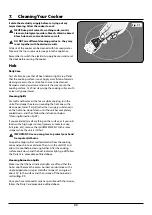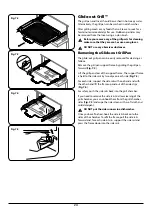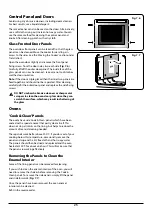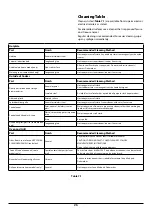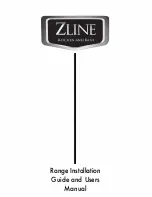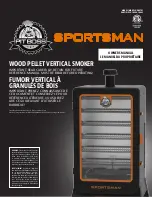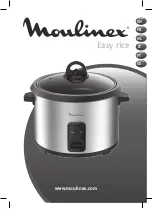
15
Conventional Oven (Top and Base Heat)
This function combines the heat from the top and
base elements. It is particularly suitable for roasting
and baking pastry, cakes and biscuits.
Food cooked on the top shelf will brown and crisp faster than
on the lower shelf, because the heat is greater at the top of
the oven than at the base, as in ‘Fan Assisted Oven’ function.
Similar items being cooked will need to be swapped around
for even cooking. This means that foods requiring different
temperatures can be cooked together, using the cooler zone
in the lower half of the oven and hotter area to the top.
The exposed top element may cook some foods too quickly,
so we recommend that the food be positioned in the lower
half of the oven to cook. The oven temperature may also need
to be lowered.
Similar items being cooked will need to be swapped around
for even cooking.
Browning Element
This function uses the element in the top of the oven
only. It is a useful function for the browning or
finishing of pasta dishes, vegetables in sauce,
shepherds pie and lasagne, the item to be browned being
already hot before switching to the top element.
Base Heat
This function uses the base element only. It will crisp
up your pizza or quiche base or finish off cooking the
base of a pastry case on a lower shelf. It is also a
gentle heat, good for slow cooking of casseroles in the
middle of the oven or for plate warming.
The Browning and Base Heat functions are useful additions
to your oven, giving you flexibility to finish off items to
perfection.
Defrost
This function operates the fan to circulate cold air
only. Make sure the temperature control is at 0°C and
that no heat is applied. This enables small items such
as desserts, cream cakes and pieces of meat, fish and poultry
to be defrosted.
Defrosting in this way speeds up the process and protects
the food from flies. Pieces of meat, fish and poultry should
be placed on a shelf, over a tray to catch any drips. Be sure to
wash the shelf and tray after defrosting.
Defrost with the oven door closed.
Large items, such as whole chickens and joints should not be
defrosted in this way. We recommend this be carried out in a
refrigerator.
Defrosting should not be carried out in a warm oven or when
an adjoining oven is in use or still warm.
Make sure that dairy foods, meat and poultry are completely
defrosted before cooking.
The Fan Oven
Fan ovens circulate hot air continuously, which means
faster, more even cooking. The recommended cooking
temperatures for a fan oven are generally lower than those
for a non-fan oven.
Note
: Please remember that all cookers vary so temperatures
in your new ovens may differ to those in your previous
cooker.
The Slow Cook Oven
The Slow Cook oven is intended for slow cooking items such
as casseroles, joints of meat, etc.
Your Slow Cook oven is capable of cooking a complete meal;
for instance – casserole, rice pudding and jacket potatoes – or
just warming the dishes (use only heat resistant dishes).
Points to Remember when Slow Cooking:
•
Preheat the oven for 20-30 minutes before starting to
cook;
• Do not
allow dishes to touch the heating elements
either side of the oven;
•
Bring casseroles, soups etc to the boil on the hob before
placing into a suitable casserole for slow cooking;
•
Make sure that casseroles have sufficient liquid,
particularly when cooking over a long period;
•
Use lids on casseroles or foil to cover food whilst it is
cooking to retain moisture;
•
Make sure all dishes will fit into the oven before
preparing the food;
•
Wrap washed and pricked jacket potatoes in foil before
cooking;
•
Make sure that meat and poultry reach a safe
temperature of at least 90 °C before eating;
•
Always thaw frozen food completely before cooking.
Your Slow Cook oven is also useful for warming plates and
serving dishes (use only heat resistant dishes).
You can cook a fruitcake in the Slow Cook oven on the
maximum heat setting (if perhaps your other ovens are in
use). If you are using the fan oven below the Slow Cook oven
at the same time allow a little more cooking time.
You can also produce crisp, white meringues cooked in the
Slow Cook oven.
Timings for cooking in the slow oven will depend upon the
temperature, quantity and type of dish you are cooking, as a
guide for casseroles, a minimum of 3 hours cooking time is
recommended.
Keep an eye on the food until you are familiar with the oven.
Summary of Contents for Nexus SE 110 Induction
Page 1: ...Nexus SE 110 Induction U110795 02 USER GUIDE INSTALLATION INSTRUCTIONS...
Page 4: ...ii...
Page 43: ...39 NOTE...
Page 44: ...40 NOTE...
Page 45: ...41 NOTE...
Page 46: ...42 NOTE...























